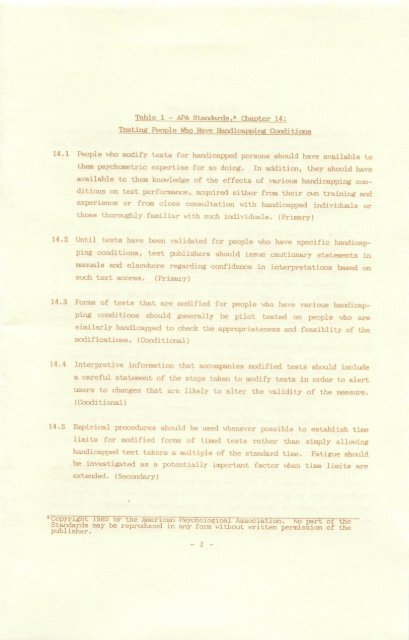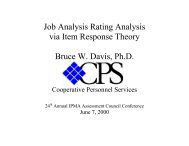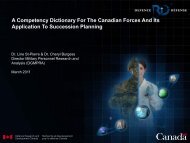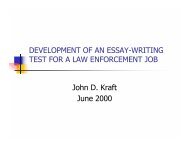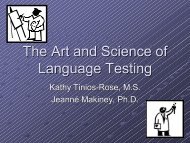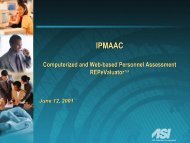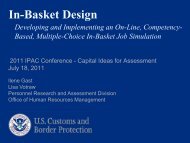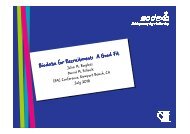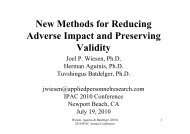Employment Testing of Persons with Diasabling Conditions - IPAC
Employment Testing of Persons with Diasabling Conditions - IPAC
Employment Testing of Persons with Diasabling Conditions - IPAC
You also want an ePaper? Increase the reach of your titles
YUMPU automatically turns print PDFs into web optimized ePapers that Google loves.
Table 1 - APA Standards.* Chapter 14:<br />
<strong>Testing</strong> People Who Have Handicapping <strong>Conditions</strong><br />
14.1 People who modify tests for handicapped persons should have available to<br />
them psychometric expertise for so doing. In addition, they should have<br />
available to them knowledge <strong>of</strong> the effects <strong>of</strong> various handicapping con<br />
ditions on test performance, acquired either from their own training and<br />
experience or from close consultation <strong>with</strong> handicapped individuals or<br />
those thoroughly familiar <strong>with</strong> such individuals. (Primary)<br />
14.2 Until tests have been validated for people who have specific handicap<br />
ping conditions, test publishers should issue cautionary statements in<br />
manuals and elsewhere regarding confidence in interpretations based on<br />
such test scores. (Primary)<br />
14.3 Forms <strong>of</strong> tests that are modified for people who have various handicap<br />
ping conditions should generally be pilot tested on people who are<br />
similarly handicapped to check the appropriateness and feasiblity <strong>of</strong> the<br />
modifications. (Conditional)<br />
14.4 Interpretive information that accompanies modified tests should include<br />
a careful statement <strong>of</strong> the steps taken to modify tests in order to alert<br />
users to changes that are likely to alter the validity <strong>of</strong> the measure.<br />
(Conditional)<br />
14.5 Empirical procedures should be used whenever possible to establish time<br />
limits for modified forms <strong>of</strong> timed tests rather than simply allowing<br />
handicapped test takers a multiple <strong>of</strong> the standard time. Fatigue should<br />
be investigated as a potentially important factor when time limits are<br />
extended. (Secondary)<br />
■UapjTight 1H83 by the American Psychological Association. No part <strong>of</strong> the<br />
bS/Ji may reproduced in any form <strong>with</strong>out written permission <strong>of</strong> the<br />
- 2 -


